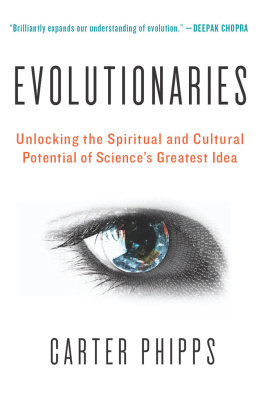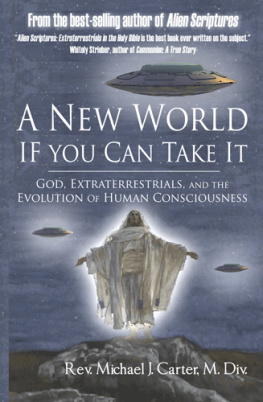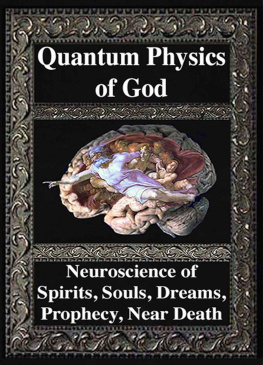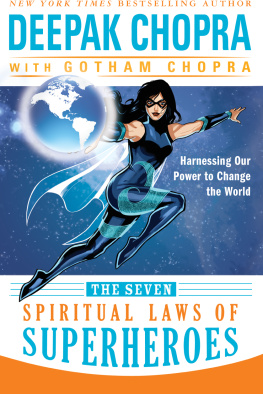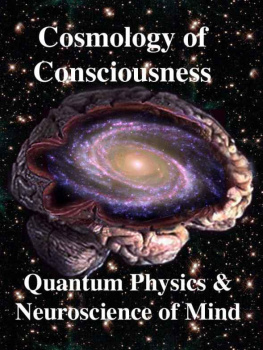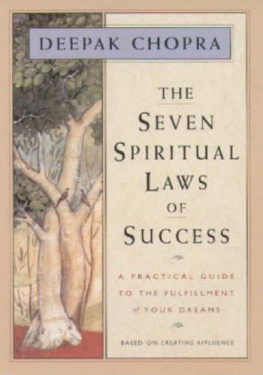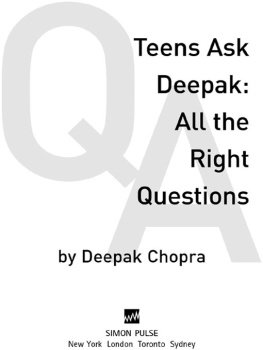
EVOLUTIONARIES
Unlocking the Spiritual and Cultural Potential of Sciences Greatest Idea
CARTER PHIPPS

To the great pioneers in evolutionary science, philosophy, and spirituality whose vision, dedication, perseverance, and faith created new pathways for us all.
We are moving!
Pierre Teilhard de Chardin, The Future of Man
Contents
D o you believe the Bible, or do you believe in evolution? The question came in an urgent whisper, passed around my eighth-grade science class with the guilty subterfuge of a dirty joke. I was thirteen years old and already I understood that there were two kinds of people in my small town on the edge of the Bible Belt: those who believed and those who didnt.
Im not talking about Godeveryone believed in God. Im talking about evolution.
Little did I realize, at that tender age, that I was confronting one of the most profound and enduring existential dilemmas of my time and culture. A few decades later, in the brave new world of the twenty-first century, that whispered question, far from being an outdated relic, is emblazoned across the covers of the most mainstream magazines: God vs. Darwin, Science vs. Spirit, The Plot to Kill Evolution... Indeed, evolution, these days, instead of just being a scientific term denoting a biological explanation for the origin of life, has become almost a pseudonym for the endemic culture wars that simmer under the surface of American society and occasionally flare up into full-fledged showdowns that temporarily consume the consciousness of our mass media. The debate over evolution, we are told, is a war between irrevocably opposed campsbetween those who look at the natural world and see the handiwork of a divine intelligence and those who look at the world and see only impersonal processes and meaningless manifestations of matter. In fact, judging from the headlines alone, one would have to conclude that we live in a world where God and evolution are mutually exclusive.
But like my Oklahoma hometown, America is not that simple. If the pollsters are to be trusted, 91 percent of Americans believe in God. And 50 percent accept the scientific theory of evolution. You just have to do the math to see that the black-and-white image of a polarized nation that makes books and magazines fly off the shelves is concealing at least a few shades of gray. In fact, as Ive found out in my extensive research over the last decade, it conceals a whole spectrum of colors.
Personally, I always knew exactly where I stood in the evolution wars. I grew up a lover of knowledge, of science, and Carl Sagan was my childhood hero. Although I was only twelve years old when Cosmos , Sagans signature PBS show on science and space, aired, I watched each episode as if it were a religious revelation. After the show, in the quiet of my bedroom, I would read the accompanying book cover to cover, letting my mind roam across the universe, imagining new worlds and new forms of matter and life. I was awed by the power of black holes, humbled by the size of quasars, and inspired by the thought that one day humans might travel among the stars.
As the years passed, I always retained that basic passion and appreciation for the ever-developing knowledge of science. There were certainly those in my hometown who saw a godless, evil half-truth in the declarations of Darwin and his intellectual descendants, but for me, my friends, and my family, evolutionlike the rest of sciencewas just another fascinating and noncontroversial fact of life.
My relationship with religion, however, has always been more complex. Raised in an intellectually adventurous family, I never thought of myself as a religious person. Yes, I went to church more Sundays than notPresbyterian was our family denomination. But church was simply a respected and honored part of the multilayered social fabric of life in a small town, not something to be taken too seriously, and certainly not something to be fanatical about. Such things were better left to the Baptists, or the overly religious folk down at the Church of Christ. By my late teenage years, however, my outlook had begun to shift. Fate seemed to instill in my young heart a passion for discovering a deeper meaning to life, and a yearning for spiritual fulfillment began to well up in my consciousness. By the end of my time at university, spiritualityand, more specifically, Eastern philosophy and meditationhad become a focal point of my life. Finally, at the age of twenty-two, in 1990, only two weeks after I graduated early from Oklahoma University, I left the world I knew behindmy honors degree, my fraternity brothers, plans for law schooland boarded a plane for the East to dedicate myself to the pursuit of wisdom, truth, and spiritual knowledge.
A decade later, I found myself in a unique positioneditor at one of the most influential and progressive spiritual and philosophical magazines in America, EnlightenNext (formerly What Is Enlightenment? ) And my early passion for science began to play a key role in my new career. In fact, the relationship between science and spirit became one of the most important areas of inquiry for a magazine dedicated to defining a post-traditional spiritual and philosophical worldview suited to a rational age. In the course of my work for EnlightenNext , I was privileged to be able to meet and interview some of the most impressive spiritual leaders and brilliant scientific pioneers alive today. I had the chance to examine where they stood on many of the most important questions confronting human culture. And I have learned that evolution is not only a line in the sand between science and faith. It is also, I have been surprised to find, a bridge that connects them.
The journey that led to the creation of this book was what author Steven Johnson calls a slow huncha gradual epiphany that coalesced around a number of important insights and encounters. As I interviewed many individuals who were breaking new ground in science, spirituality, philosophy, psychology, and even traditional religion, I noticed that a common theme was emergingevolution. They were informed and inspired by sciences revelation of our biological and cosmic history, and in some cases explicitly championing the notion of evolution as a new way of making meaning out of life in the twenty-first century. In the hands of some, this evolutionary inspiration leaned toward secularism and humanism, and in the hands of others it leaned toward pantheism or even theism. But they all shared a common evolutionary context for interpreting their fields. We were witnessing, I eventually concluded, the birth of an authentic new spiritual and philosophical worldview. This new worldview was science-friendly and placed questions of human purpose and meaning fully in the context of an evolutionary cosmos. It has been slowly emerging in the culture over the last two centuries but has picked up steam in the last two decades.
To be sure, there is still little cultural mind-space in mainstream America for the emergence of evolutionarily inspired forms of meaning and purpose. Lets be honest: God vs. Darwin has great media resonance. But more and more intelligent people are beginning to question this easy dichotomy. In fact, long before I fully understood what a critical role evolution would play in developing a worldview that is adequate to meet the demands of a new century, I knew that the choice the popular media so often presentsbelieve in God or believe in evolution; embrace atheism or be lumped in with intelligent designis a false choice. It is not actually a choice between the spiritual impulse and the scientific impulse but between two worldviews: one that believes in the ultimate primacy of matter and one that believes in the ultimate primacy of an ancient god. And I, for one, dont believe in either.
Next page
